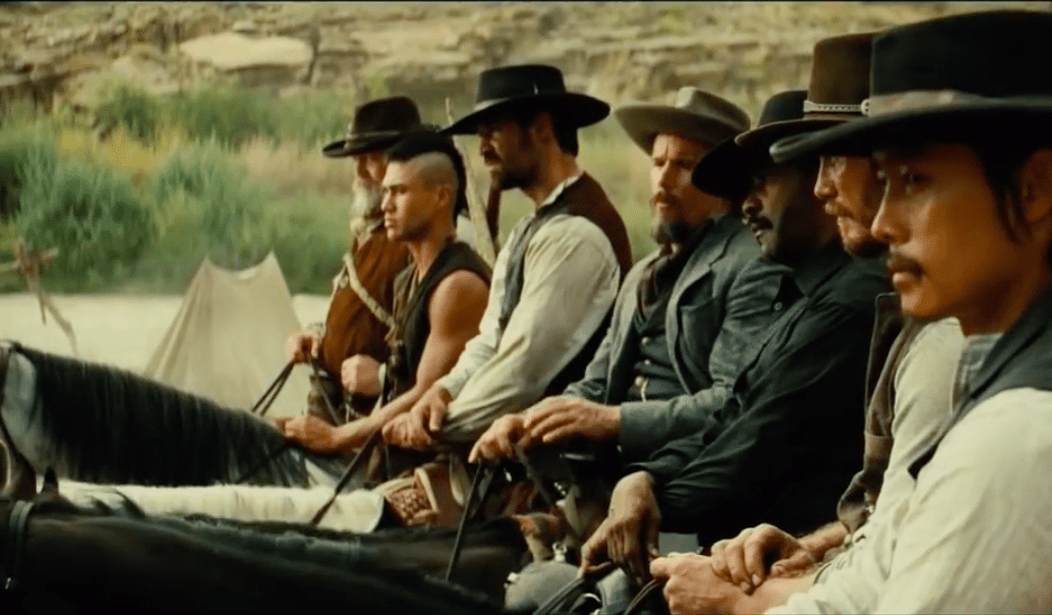The vibrant, star-studded, hilarious remake of The Magnificent Seven (here’s PJ Media’s review) opened to strong box office debut this weekend, taking $35 million, leaving its competition Storks in the dust with $21.8 million. The Western remake has a great deal to recommend it — in addition to the action, humor, and witty dialogue, the film makes six references to the Christian faith, well-timed and even moving.
Some references proved less than reverent, but the underlying Christian theme was clear — this faith, which did play a stabilizing role despite the lawlessness of the old West, is a clear and fundamental part of the characters’ lives, and that is for the better.
1. “The Lord’s house is no place for guns.”
One of the egregious sins the notorious villain and stock “Robber Baron” Bartholomew Bogue (played by Peter Sarsgaard, Jarhead 2005) commits is to bring firearms into a church. This is his first act in the movie, and it violates the Christian notion that the house of God is a sanctuary, where people can find peace and respite from the evils of the world. By invading the church with weapons, Bogue commits an act of sacrilege that is not easily forgotten.
2. “Jesus Wept.”
In one hilarious moment, the gambler Josh Faraday (played by the ever colorful Chris Pratt, Guardians of the Galaxy 2014), quotes the shortest verse in the Bible, John 11:35. The film’s heroes are training farmers how to shoot, and not one of the thirty-plus farmers can hit any of the targets. To this fiasco, Faraday quips, “Jesus wept.”
This less-than-reverent application of the Bible fits the Western spirit — for a culture deeply rooted in the scriptures, Bible verses likely were used to make jokes.
Next Page: Confession and the Lord’s Prayer — in an action film.
3. “Let’s hope, if we die, we’ve confessed.”
Before a major battle, the outlaw Vasquez (Manuel Garcia-Rulfo, Cake 2014), who is referred to as “the Mexican,” sheepishly declares, “Let’s hope, if we die, we’ve confessed.” This is a reference to the Roman Catholic idea that confession and absolution (a sacrament in the Roman Catholic Church), cleanses a believer from a “state of sin,” leaving their soul in a “state of grace.” If a Catholic dies having committed a “mortal sin” and not having repented, he will go to Hell, regardless of other good works throughout his life.
This reference to Catholic belief underscores the diversity of the film, both racially and religiously. Most of the settlers in the old West would have been Protestants, who believe that placing your faith in Jesus’ death and resurrection is enough to guarantee salvation. But not everyone in the old West was Protestant, and Catholics have a very different view of salvation, captured briefly in this quote.
4. “Whenever two or more are gathered in my name…”
The night before a big battle, the town comes together and the minister leads them in prayer. He opens by reminding them the words of Jesus in Matthew 18:20, “For when two or three are gathered together in my name, there am I in the midst of them.” This is indeed a fitting verse to open a prayer service, and to comfort townsfolk who are under attack.
5. “Our Father who art in Heaven, hallowed be thy name…”
The Magnificent Seven also featured the most well-known Christian prayer. When his disciples asked him how to pray, Jesus gave them the Lord’s Prayer (Matthew 6:9-13). Characters pray this prayer before the final battle.
Next Page: One more Bible quote, and what it all means.
6. “Though I walk through the valley of the shadow of death…”
While running into battle, the racker Jack Horne (Vincent D’Onofrio, Men in Black, 1997) quotes Psalm 23. Verse 4 inspires him to face the foe, as he declares in prayer, “Though I walk through the valley of the shadow of death, I will fear no evil: for thou art with me.”
This psalm is rightly famous for its confidence in God’s promises, despite negative circumstances. It is indeed heartening to see it quoted in a mainstream Hollywood flick.
So what does it all mean? These Christian references in a Western movie fit well, and suggest that Hollywood is willing to feature scripture and themes which are true to the old West, even if they are more controversial today. The religious liberty of conservative Christians is indeed under threat today, but great movies still feature scripture and clear Christian themes.
In the end, The Magnificent Seven is just one more movie — no matter how well it ends up doing at the box office. But its inclusion of Christian themes is heartening at a time when many Christians see their values under attack.









Join the conversation as a VIP Member